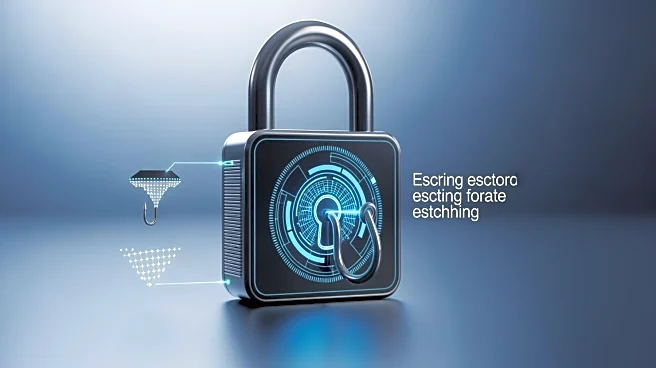What's Happening?
A report from Barracuda has revealed that the Whisper 2FA phishing-as-a-service (PhaaS) kit has fueled nearly a million phishing intrusions since July. This kit is now the third most prevalent PhaaS kit,
following Tycoon and EvilProxy. The phishing emails using Whisper 2FA have spoofed multiple major brands, including Microsoft 365, Adobe, and DocuSign. The kit utilizes AJAX web technology to capture credentials and multi-factor authentication codes, conducting real-time code validation. The latest versions of Whisper 2FA incorporate advanced features such as dense Base64 and XOR encoding layers, anti-debugging capabilities, and browser freezing to prevent developer analysis of phishing pages. Barracuda highlights the evolution of phishing kits from simple credential stealers to sophisticated attack platforms, reflecting the rise of PhaaS where kits are professionally developed, updated, and sold or leased to attackers.
Why It's Important?
The escalation of phishing attacks using the Whisper 2FA PhaaS kit poses significant threats to cybersecurity, particularly for businesses and individuals relying on digital platforms for communication and transactions. The sophistication of these kits indicates a growing challenge for cybersecurity professionals who must continuously adapt to evolving threats. Major brands being spoofed in these attacks could lead to widespread data breaches, financial losses, and erosion of consumer trust. The rise of PhaaS highlights the need for enhanced security measures, including robust multi-factor authentication systems and real-time monitoring solutions to detect and mitigate phishing attempts. Organizations must prioritize cybersecurity investments to protect sensitive information and maintain operational integrity.
What's Next?
As phishing kits like Whisper 2FA continue to evolve, cybersecurity firms and affected brands are likely to increase their efforts in developing countermeasures. This may include deploying advanced AI-driven detection systems, enhancing user education on phishing risks, and collaborating with law enforcement to track and dismantle PhaaS operations. Companies may also need to reassess their security protocols and invest in more sophisticated authentication technologies to safeguard against these threats. The ongoing battle against phishing will require a coordinated approach involving technology innovation, policy development, and international cooperation to effectively combat the growing menace of PhaaS.
Beyond the Headlines
The rise of PhaaS kits like Whisper 2FA underscores a broader trend in cybercrime where attacks are becoming more commoditized and accessible to less skilled attackers. This democratization of cybercrime tools could lead to an increase in the frequency and scale of attacks, challenging existing cybersecurity frameworks. Ethical considerations arise as the line between legitimate software development and malicious intent blurs, prompting discussions on the responsibilities of software developers and platforms in preventing misuse. Long-term, this trend may drive significant changes in cybersecurity policies and practices, emphasizing proactive threat intelligence and international collaboration.










